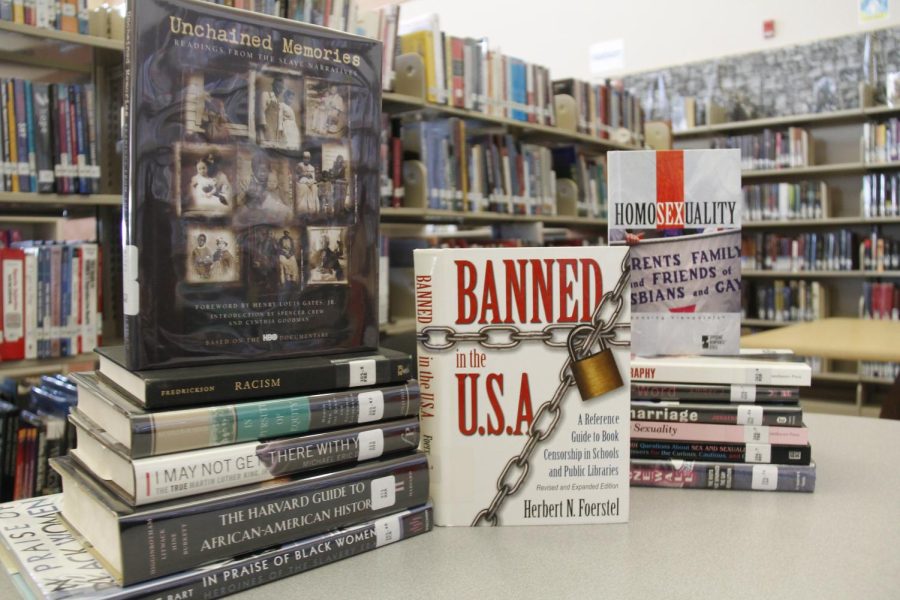Florida legislature bans books, places regulation on education surrounding marginalized communities
In the library, books call attention to the banning of literature about POC and LGBTQ+ in Florida schools. Photo by Liliana Galdarisi.
In the past two years, Florida has targeted the LGBTQ+ community by passing around 600 bills and laws. One of the better known is HB 1557 or the “Don’t Say Gay” bill, which prohibits teaching about gender and sexuality in the classroom because it was deemed inappropriate and does not give parents a choice to decide when their child was introduced to the idea of LGBTQ+ individuals.
“I am concerned because of the health and safety of LGBTQ kids, adults, and everybody, specifically the kids. Gay people, myself included, exist, we exist, whether you acknowledge us or not. There are LGBTQ kids in school, and when you don’t have a name for them, I think it’s psychologically damaging to their health and safety. Schools should be working towards inclusivity, not against it,” GSA advisor Mrs. Laura Brun said.
The censorship of content being taught also extends to students learning about people of color and their history. HB 7 has regulations on what students from kindergarten to college can learn about. It teaches that any race should be discriminated against to gain equality, diversity and inclusion.
“I understand that there are themes or language children shouldn’t be exposed to at a young age due to lack in maturity, but it feels much more targeted towards communities of color; having to live through generational pain and mistreatment all to be silenced again by the very same people who suppressed your voice, to begin with,” BSU president Samara Frank said.
While what is happening in Florida does not directly hurt students in California, it still raises concerns.
“It’s not right to erase the LGBTQ+ community – it’s harmful, silly, and doesn’t make sense. I am part of the community and most of my friends are. I also know people in Florida personally that are affected,” Robert Baker said.
Not only are the bills affecting teaching but books in the libraries as well. Bill HB 1467 requires the school district to catalog all the books that are going on the shelves, and if there are complaints about the contents of a book, a formal review process has to be done. They can be put up for review if the contents are considered pornographic, violent or inappropriate.
Librarian Mrs. Karina Snow said. “ And when you limit that access, it limits those people who need to read those items. I believe in free choice, and we all have the freedom to choose. So you can choose not to read those books if they’re not for you. I don’t believe you have the right to tell somebody else what they can and cannot read,”
PEN America is a non-profit organization that defends and celebrates free expression worldwide through literature and human rights. They have surveyed that in Florida alone between July 1, 2021, and June 30, 2022, over 500 books were up for review. A majority were banned in libraries and classrooms, such as “Stonewall: A Building. An Uprising. A Revolution.” by Rob Sanders, “All Boys Aren’t Blue” by George Johnson, and “Thank You, Jackie Robinson” by Barbara Cohen.
Ms. Meredith Kane said, “We’ve seen throughout history, books have been banned because some people are afraid. But if we were to learn about everyone else, people wouldn’t be nearly as afraid as they are.”
by LILIANA GALDARISI, KATIE LACY & EIRON ARIANA ORDONA

